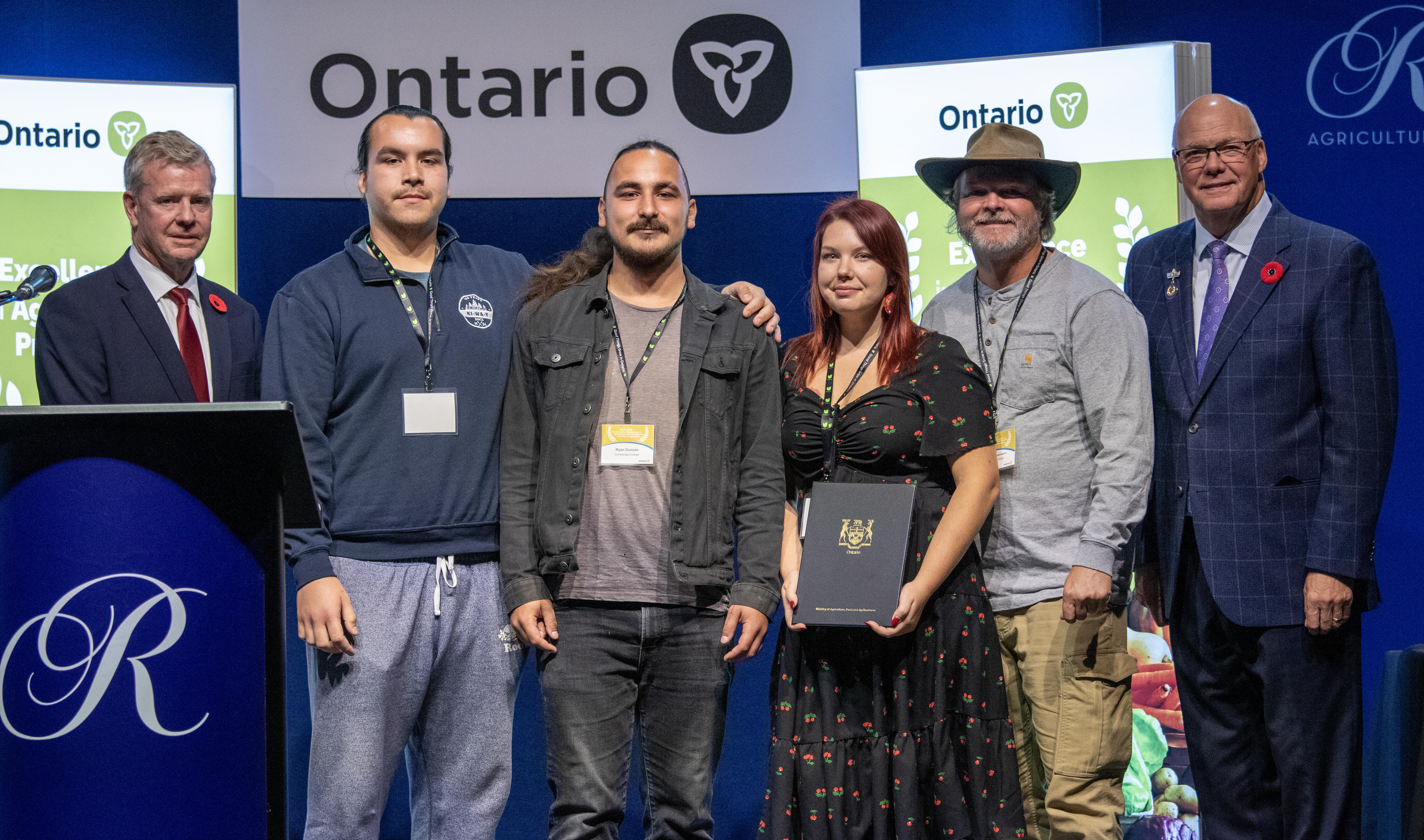The Wiijindamaan Indigenous Land Futurity and Gdoo-naaganinaa garden at Conestoga received an honourable mention for urban agriculture in the 2024 Excellence in Agriculture Awards.

Brunson Big Bear Paquette Hardy (second from left to right), Ryan Duncan, Alissa Gee and Dr. Stephen Svenson accept an honourable mention for urban agriculture in the 2024 Excellence in Agriculture Awards.
The Ontario government’s Excellence in Agriculture Awards recognize businesses, individuals and organizations that have raised the bar for excellence in the agriculture and food industry and demonstrated leadership in their field.
The Wiijindamaan Indigenous Land Futurity and Gdoo-naaganinaa garden focus on exposing students and the broader Waterloo Region community to Indigenous agricultural practices.
The Gdoo-naaganinaa garden started in 2021 at the Kitchener - Doon campus, as part of a research project “Restoring Language, Culture, and Land” supported by the College and Community Innovation Program’s College and Community Social Innovation Fund. The garden serves as a living classroom to cultivate a better understanding of Indigenous land-based practices and knowledge.
That initiative was followed by an additional urban agriculture location established in collaboration with the City of Kitchener, White Owl Native Ancestry Association, Wisahkotewinowak garden collective and other members of the Indigenous community on 33 acres of land next to the Grand River. The Wiijindamaan Indigenous Land Futurity project was also supported in part by the College and Community Social Innovation Fund and work included an initial assessment of the land, soil and ecology and planting efforts.
The Doon garden has been a welcome retreat for Brunson Big Bear Paquette Hardy, who was assistant researcher over the past two years while a student in the General Arts and Science program and now a volunteer as a graduate.
He helped with heavy lifting to create the garden, including using logs to create beds for the wide variety of plants. The focus is on food security and produce is made available to students through Be-Dah-Bin Gamik, which looks out over the gardens that grow a bounty of tomato, cucumber, asparagus, squash, kale, sunchokes, strawberries, raspberries and amaranth.
All four sacred medicines from Anishnaabe culture are cultivated: tobacco, sweetgrass, sage and cedar. The medicines are collected for personal use and the Indigenous community is also encouraged to make use of the harvest.
However, the gardens don’t just nurture flora and are another step toward reconciliation.
“I really appreciate how our project brought together a community,” said Paquette Hardy, from Biinjitiwaabik Zaaging Anishnaabek in Northwestern Ontario.
Everything achieved wouldn’t have been possible without people coming together to tackle the many tasks that needed to get done, he said. While the project is Indigenous led, anyone is welcome to get involved. Often while Paquette Hardy was working in the garden, people walking by would stop to ask questions about the project and what is being grown.
“You need to show them and tell them about it,” Paquette Hardy said. “Out on the land, nobody is more important.”
Projects like this are important, he said, because they bring people from all different walks of life together. Tending the garden alongside each other, people talk and create connections. Volunteer opportunites are available.
The awards were presented by the Ministry of Agriculture, Food and Agribusiness at the Royal Winter Fair in Toronto on November 2.
